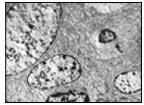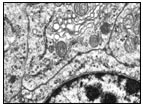Kahalalide F preferentially
induces cell death via oncosis in tumor cells
(Breast and Prostate
Cancer-February 5, 2004)
According to a study from
Spain, "Kahalalide F is a novel antitumor drug of marine origin under
clinical investigation that showed a potent cytotoxic activity against a
panel of human prostate and breast cancer cell lines, with IC50 ranging from
0.07 microm (PC3) to 0.28 microm (DU145, LNCaP, SKBR-3, BT474, MCF7).
"Importantly, nontumor human cells (MCF10A, HUVEC, HMEC-1, IMR90) were 5-40
times less sensitive to the drug (IC50 = 1.6-3.1 micro M). KF cytotoxicity
did not correlate with the expression level of the multidrug resistance MDR1
and of the tyrosine kinase HER2/NEU, and only slightly by the antiapoptotic
BCL-2 protein," wrote Y. Suarez and colleagues, University of Autonoma
Madrid, CSIC.
(IC50 = 1.6-3.1 micro M). KF cytotoxicity
did not correlate with the expression level of the multidrug resistance MDR1
and of the tyrosine kinase HER2/NEU, and only slightly by the antiapoptotic
BCL-2 protein," wrote Y. Suarez and colleagues, University of Autonoma
Madrid, CSIC.
"KF action was triggered rapidly by short pulse treatments (15 min caused
50% maximum cytotoxicity). Neither a general caspase inhibitor (Z-VAD-fmk)
nor transcription or translation inhibitors (actinomycin D, cycloheximide)
blocked KF action. Flow cytometry analysis revealed that KF induced neither
cell-cycle arrest nor apoptotic hypodiploid peak. Using mitochondrial
(JC-1)- and lysosomal (LysoTracker Green, Acridine Orange)-specific
fluorophores, we detected loss of mitochondrial membrane potential and of
lysosomal integrity following KF treatment," the researchers wrote.
"Confocal laser and electron microscopy revealed that KF-treated cells
underwent a series of profound alterations including severe cytoplasmic
swelling and vacuolization, dilation, and vesiculation of the endoplasmic
reticulum, mitochondrial damage, and plasma membrane rupture," they added.
including severe cytoplasmic
swelling and vacuolization, dilation, and vesiculation of the endoplasmic
reticulum, mitochondrial damage, and plasma membrane rupture," they added.
The researchers concluded: "In contrast, the cell nucleus showed irregular
clumping of chromatin into small, condensed masses, while chromatin
disappeared from other nuclear domains, but the nuclear envelope was
preserved and no DNA degradation was detected. Together, these data indicate
that KF induces cell death via oncosis preferentially in tumor cells."
Suarez and colleagues published the results of their research in Molecular
Cancer Therapeutics (Kahalalide F, a new marine-derived compound, induces
oncosis in human prostate and breast cancer cells. Mol Cancer Ther,
2003;2(9):863-872).
The information in this article comes under the major subject areas of
Urology and Oncology. This article was prepared by Women's Health Weekly
editors from staff and other reports.
ęCopyright 2004, Health &
Medicine Week via NewsRx.com & NewsRx.net